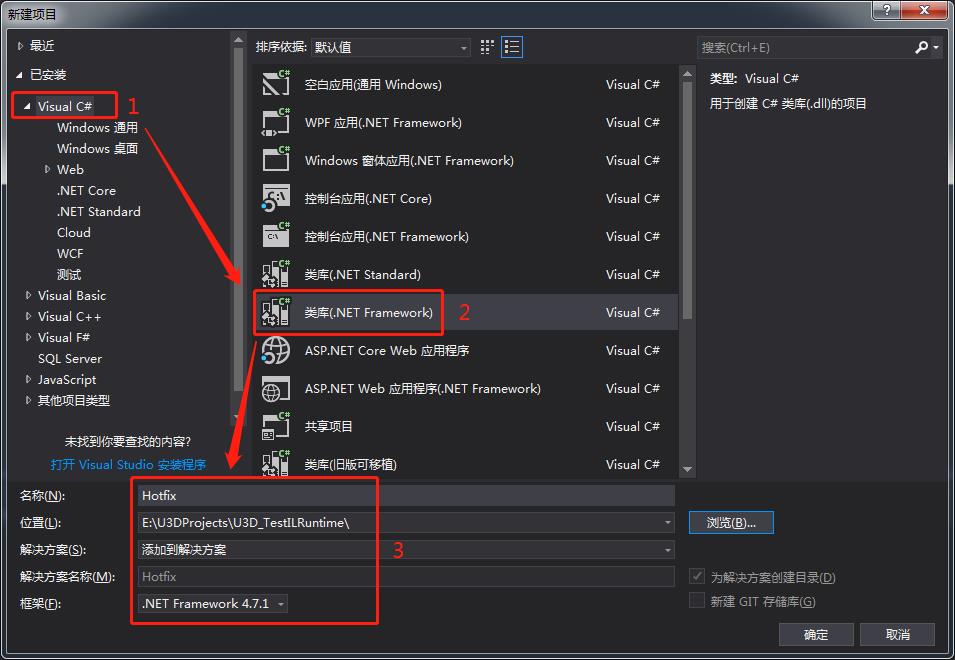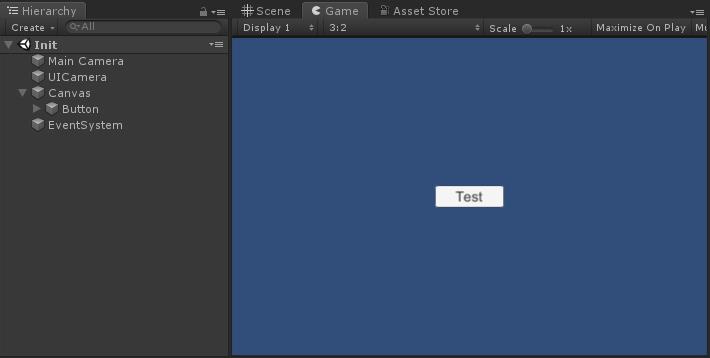Unity热更模块基于 HybridCLR + Addressable
Posted YOLO_TO_GAME
tags:
篇首语:本文由小常识网(cha138.com)小编为大家整理,主要介绍了Unity热更模块基于 HybridCLR + Addressable相关的知识,希望对你有一定的参考价值。
代码地址:
此工程热更模块基于 HybridCLR + Addressable
- https://github.com/focus-creative-games/HybridCLR 原Huatuo
- Addressables | Addressables | 1.20.5 Addressables
同时支持资源和逻辑热更的基础工程
项目包含一个完整的小游戏实例
游戏介绍
游戏通过监听麦克风音量,来控制角色上下移动,角色掉到最下面则游戏结束。
游戏资源全部来源于 OpenGameArt.org

UI框架基于QFramework
使用框架的UI工具集,并加以改进
渲染基于URP
因为URP对2D光照和阴影的支持,选择了URP
如何让小游戏运行并实现热更
HybridCLR
参考 https://github.com/focus-creative-games/hybridclr_trial 实例项目的README
Addressable
需要利用Addressables Hosting搭建一个本地服务器,并把电脑的防火墙关闭,确保手机和电脑处于同一网络,便可实现热更
其他
(1)如需做新的界面,需要对QFramework进行简单了解,可快速实现;
(2)Shader编写,需要基于URP,使用HLSL;
(3)Unity 版本使用是2020.3.26f1c1,使用3.xx版本都可以
FAQ
代码剪切
(1)TypeLoadException:Could not load type 'UnityEngine.Microphone' frome assembly 'UnityEngine.AudioModule', 出现类似问题,需要修改Assets文件夹下的link文件,添加相应Assembly;
(2)android 权限获取,参考Unity官方文档 平台开发/Android/Device features and permissions;
Unity 接入 ILRuntime 热更方案
引言
最近看了一下 ET 框架,本来只是研究一下网络模块,后来抽时间看一下热更框架。ET 的热更使用的不是像 tolua 这样基于 Lua 的方案,而是基于 ILRuntime 的纯 C# 热更实现方案。
ILRuntime 的实现原理
对 Unity 引擎有一定了解的开发者都应该知道: Unity 支持使用 C# 做脚本语言,是依赖 Mono 引擎运行 C# 编译后的 IL 中间语言。ILRuntime 借助 Mono.Cecil 库来读取 DLL 的 PE 信息,以及当中类型的所有信息,最终得到方法的 IL 汇编码,然后通过内置的 IL 解译执行虚拟机来执行 DLL 中的代码。
Cecil 是一个用来生成(修改和创建)和检查 ECMA CIL 格式的程序和库的库,可以完成如下操作:
使用简单而强大的对象模型分析 .NET 二进制文件,无需通过加载程序集即可使用 Reflection(反射)
修改 .NET 二进制文件,添加新的元数据结构并更改 IL 代码
Cecil 官网: http://cecil.pe
相关资源
ILRuntime 是 2016 年发布的一个开源项目,2017 年发布了第一个正式版,地址 Ourpalm/ILRuntime
$ git clone https://github.com/Ourpalm/ILRuntime.git官方提供的 Unity Demo
官方中文文档 ILRuntime Doc 其中包含:
教程
其他
Unity 集成步骤
参考官方文档 从零开始,基本就一下几个步骤:
-
下载最新的 release 版本 ILRuntime-1.4.zip ,然后解压缩
-
将 ILRuntime 源码工程下的
Mono.Cecil.20、Mono.Cecil.Pdb和ILRuntime复制到 Unity 工程 Assets 目录下需删除这些目录下的
bin、obj和Properties子目录,还有.csproj文件 -
Unity 开启 unsafe 模式
在 Assets 目录下创建一个命名为
smcs.rsp文本文件,内容为-unsafe-
Unity5.4及以前的版本,且编译设置是.Net 2.0而不是.Net 2.0 Subset的话, 需要将smcs.rsp文件名改成gmcs.rsp -
Unity5.5以上的版本,需要将smcs.rsp文件名改成mcs.rsp
-
-
创建热更工程(Hotfix)
热更工程是一个独立于 Unity 工程的一个独立的 C# 类库工程,这里需用借助 VS 2017 来完成创建操作,创建步骤如下:
-
使用 VS 2017 打开当前 Unity 工程的
.sln文件 -
文件-新建-项目,选择Visual C#栏 中的类库(.NET Framework),然后完成剩余的设置:命名为 Hotfix 位置是 Unity 工程根目录 解决方案为 添加到解决方案 (即添加到当前 Unity 的解决方案内) 框架设置为与 Unity 工程版本一样的 .NET Framwork 4.7.1(根据自己项目情况选择)
然后点击
确定创建出 Hotfix 工程。 -
在
解决方案管理器中选择Hotfix工程的引用选项,右键-添加引用,通过浏览按钮依次添加如下四个库文件:Unity 引擎自带的工具库
Unity引擎安装目录\\Editor\\Data\\Managed\\UnityEngine\\UnityEngine.dll Unity引擎安装目录\\Editor\\Data\\Managed\\UnityEngine\\UnityEngine.CoreModule.dll Unity引擎安装目录\\Editor\\Data\\UnityExtensions\\Unity\\GUISystem\\UnityEngine.UI.dllUnityEngine.CoreModule.dll 是在 Unity2017.2 之后的版本才有,低版本的 Unity 无需添加此文件
Unity 工程的业务代码库
Unity工程目录\\Library\\ScriptAssemblies\\Assembly-CSharp.dll
到这里 Hotfix 工程就创建成功了,下面便是具体的测试代码。
-
测试代码
这个要测试两个方面,一是在 Hotfix 工程中调用 Unity 的接口,二是在 Unity 工程中调用 Hotfix 提供的接口。这里参考 ILRuntime中的反射 文档即可实现,具体如下:
-
创建场景
在 Unity 工程中创建一个空场景,添加一个 UI 相机、Canvas 和 一个测试按钮,结构如下:

-
从 Unity 中调用 Hotfix 提供的静态方法和非静态方法:
using System; using System.Collections.Generic; using System.Linq; using System.Text; using System.Threading.Tasks; using UnityEngine; namespace Hotfix public class Test // 不带参 public static String GetMsg() Debug.Log("call static GetMsg"); return "Test Hotfix, static"; // 带参 public static String GetMsg1(int num) Debug.Log("call static GetMsg1, num = " + num); return "Test Hotfix, static, num = " + num; // 非静态 public String GetMsg2() Debug.Log("call GetMsg2"); return "Test Hotfix, no static";Unity 工程中调用的逻辑如下:
void ILRuntimeTest() Debug.Log(appdomain.Invoke("Hotfix.Test", "GetMsg", null, null)); object[] param = new object[1]; param[0] = 666; Debug.Log(appdomain.Invoke("Hotfix.Test", "GetMsg1", null, param)); // 创建一个 Test 对象 var testInst = appdomain.Instantiate("Hotfix.Test"); Debug.Log(appdomain.Invoke("Hotfix.Test", "GetMsg2", testInst, null));这里 appdomain 是一个
ILRuntime.Runtime.Enviorment.AppDomain实例对象,需要加载 Hotfix.dll 后才能开始执行上述的测试方法。 -
从 Unity 提供给 Hotfix 调用的静态和非静态方法:
-
调用 Unity 工程中的类方法
上面的测试代码其实用到了 Unity 的
Engine.Debug.Log接口,基本是直接调用 Unity 工程中的类方法,但这样存在性能问题,后面通过 CLR 绑定来优化性能。 -
继承 Unity 工程中的类或实现接口
假如需要在 Hotfix 工程中继承 Unity 工程中的类或实现接口,则需要在 Unity 工程中增加对应类或接口的适配器。
-
使用 Unity 中的值类型,如:Vector3、Vector2 等
也是可以直接调用,但也需要使用 CLR 绑定来做性能优化。
-
Hotfix 工程中使用委托
假如只是 Hotfix 工程内部使用的委托,无需做任何额外操作(因为委托是 C# 的特性,而非 Unity 的)。但假如需要将 Hotfix 工程中的委托实例传给 Unity 工程,也需要根据情况添加额外的适配器和转化器。
这里在 Unity 工程中定义一个 IUIBase 的接口:
public interface IUIBase void Show(); void Hide(); string GetStr();对应的 Unity 工程中得定义一个 IUIBaseAdapter 适配器:
using System; using ILRuntime.CLR.Method; using ILRuntime.Runtime.Enviorment; using ILRuntime.Runtime.Intepreter; public class IUIBaseAdapter : CrossBindingAdaptor public override Type BaseCLRType get return typeof (IUIBase); public override Type AdaptorType get return typeof (Adaptor); public override object CreateCLRInstance(ILRuntime.Runtime.Enviorment.AppDomain appdomain, ILTypeInstance instance) return new Adaptor(appdomain, instance); public class Adaptor : IUIBase, CrossBindingAdaptorType ILTypeInstance instance; ILRuntime.Runtime.Enviorment.AppDomain appdomain; IMethod mHide; IMethod mGetStr; IMethod mShow; public Adaptor() public Adaptor(ILRuntime.Runtime.Enviorment.AppDomain appdomain, ILTypeInstance instance) this.appdomain = appdomain; this.instance = instance; public ILTypeInstance ILInstance get return instance; public void Hide() if(mHide == null) mHide = instance.Type.GetMethod("Hide", 0); if(mHide != null) this.appdomain.Invoke(this.mHide, instance, null); public void Show() if(mShow == null) mShow = instance.Type.GetMethod("Show", 0); if(mShow != null) this.appdomain.Invoke(this.mShow, instance, null); public string GetStr() if(mGetStr == null) mGetStr = instance.Type.GetMethod("GetStr", 0); if(mGetStr != null) return this.appdomain.Invoke(this.mGetStr, instance, null).ToString(); return "";在 Hotfix 工程中让 Test 类实现此接口:
using System; using System.Collections.Generic; using System.Linq; using System.Text; using System.Threading.Tasks; using UnityEngine; namespace Hotfix public class Test : IUIInterface ... public void Hide() Debug.Log("TestUI Hide"); public void Show() Debug.Log("TestUI Show"); Button btn = GameObject.Find("Canvas/Button").GetComponent<Button>(); btn.onClick.AddListener(OnClick); public string GetStr() return "Test GetStr"; void OnClick() Debug.Log("OnClick Btn"); 在 Unity 工程中初始化 ILRuntime 时绑定适配器:
appdomain.RegisterCrossBindingAdaptor(new IUIInterfaceAdapter());创建 Test 对象并调用接口方法:
var testInst = appdomain.Instantiate<IUIInterface>("Hotfix.Test"); testInst.Hide(); Debug.Log(testInst.GetStr()); -
委托
这里主要分析将 Hotfix 工程内的委托实例传给外部使用的情况,此时需要将委托实例转换成真正的 CLR(C#运行时)委托实例,即通过动态创建 CLR 的委托实例。由于 IL2CPP 之类的 AOT 编译技术无法在运行时生成新的类型,所以在创建委托实例的时候 ILRuntime 选择了显示注册的方式,以保证问题不被隐藏到线上才发现。
-
委托适配器:
参数组合一致的各种 delegate 与 Action/Func 可以共用同一个委托适配器:(Func 是有返回值的泛型委托)
delegate void SomeDelegate(int a, float b); Action<int, float> act;适配器无需单独定义脚本,只需在 Unity 工程初始化 ILRuntime 的 AppDomain 时注册即可,如:
appDomain.DelegateManager.RegisterMethodDelegate<int, float>();带返回值类型的委托:(Action 是无返回值的泛型委托)
delegate bool SomeFunction(int a, float b); Func<int, float, bool> act;注册如下:
appDomain.DelegateManager.RegisterFunctionDelegate<int, float, bool>(); -
委托转换器:
ILRuntime 内是使用 Action 和 Func 两个系统自带的委托类型来生成委托实例的,因此如果在 Hotfix 工程中用到的非 Action 和 Func 格式定义的委托实例要传给 Unity 工程中使用,需要在注册委托的地方通过转换器转成真正需要的委托类型:
app.DelegateManager.RegisterDelegateConvertor<SomeFunction>((action) => return new SomeFunction((a, b) => return ((Func<int, float, bool>)action)(a, b); ); );
以上面 Hotfix 工程中监听安装为例,onClick 监听其实是基于 UnityAction 来实现的,这就是一个委托,其定义如下:
namespace UnityEngine.Events
//
// 摘要:
// Zero argument delegate used by UnityEvents.
public delegate void UnityAction();
那么在 Unity 工程就需要注册此委托的转化器:
appdomain.DelegateManager.RegisterDelegateConvertor<UnityEngine.Events.UnityAction>((act) =>
return new UnityEngine.Events.UnityAction(() =>
((Action)act)();
);
);当然,假如忘记注册委托的转化器,运行 Unity 工程便会报错如下,根据报错来补全代码也可以:
KeyNotFoundException: Cannot find convertor for UnityEngine.Events.UnityAction
Please add following code:
appdomain.DelegateManager.RegisterDelegateConvertor<UnityEngine.Events.UnityAction>((act) =>
return new UnityEngine.Events.UnityAction(() =>
((Action<>)act)();
);
);官方的建议:
尽量
避免不必要的跨域委托调用尽量使用
Action以及Func这两个系统内置万用委托类型
跨域继承
假如想在 Hotfix 工程中继承 Unity 工程中的一个类,或者实现 Unity 工程中的一个接口,需要在 Unity 工程中实现一个 继承适配器 。官方 Demo 工程提供了三个适配器例子:InheritanceAdapter、CoroutineAdapter 和 MonoBehaviourAdapter,适配器都是继承自 CrossBindingAdaptor 的类,其中有内部类、继承和实现接口的方法。适配器类以下有几点要求:
-
适配器必须实现抽象类 CrossBindingAdaptor 中的三个接口:
BaseCLRType 、AdaptorType 和 CreateCLRInstance
public override Type BaseCLRType get return typeof (继承类); public override Type AdaptorType get return typeof (Adaptor); public override object CreateCLRInstance(ILRuntime.Runtime.Enviorment.AppDomain appdomain, ILTypeInstance instance) return new Adaptor(appdomain, instance);
-
内部类继承自你想要提供给 Hotfix 中继承的类,且需要实现
CrossBindingAdaptorType接口:提供与上面 CreateCLRInstance 实例化对象对应的构造方法和 ILInstance 接口
public class Adaptor : 继承类, CrossBindingAdaptorType ILTypeInstance instance; ILRuntime.Runtime.Enviorment.AppDomain appdomain; public Adaptor() public Adaptor(ILRuntime.Runtime.Enviorment.AppDomain appdomain, ILTypeInstance instance) this.appdomain = appdomain; this.instance = instance; public ILTypeInstance ILInstance get return instance;
-
剩下的就是在内部类中重写所有需要暴露给 Hotfix 工程使用的接口:
下面是实现接口方法和重写虚函数和抽象函数的大致逻辑
IMethod m继承类的虚函数名; // 虚函数是否在调用中标识 bool is继承类的虚函数名Invoking = false; IMethod m实现接口的方法名; object[] param1 = new object[继承类的虚函数名参数数量]; object[] param2 = new object[实现接口方法的参数数量]; // 重写虚函数 public override void 继承类的虚函数名(参数表) if(m继承类的虚函数名 == null) m继承类的虚函数名 = instance.Type.GetMethod("继承类的虚函数名", 继承类的虚函数名参数数量); if(m继承类的虚函数名 != null&& !is继承类的虚函数名Invoking) is继承类的虚函数名Invoking = true; // param1 传入参数表内容 param1[0] = 参数表[0]; ... this.appdomain.Invoke(m继承类的虚函数名, instance, this.param1); is继承类的虚函数名Invoking = false; else base.继承类的虚函数名(参数表); // 实现接口 public void 实现接口的方法名(参数表) if(m实现接口的方法名 == null) m实现接口的方法名 = instance.Type.GetMethod("实现接口的方法名", 实现接口方法的参数数量); if(m实现接口的方法名 != null) // param1 传入参数表内容 param2[0] = 参数表[0]; ... this.appdomain.Invoke(m实现接口的方法名, instance, this.param2); // 重写抽象函数 public override void 继承类的抽象方法名(参数表) // 基本与实现接口一样,多个 override 关键字而已 ...需要特别注意的细节点 :
-
没有参数建议显式传递 null 为参数列表,否则会自动 new object[0] 导致 GC Alloc
-
对于虚函数而言,必须设定一个标识位来确定是否当前已经在调用中,否则如果脚本类中调用
base.继承类的方法名()就会造成无限循环,最终导致爆栈
更多细节查看官网文档 ILRuntime中跨域继承
-
为什么要写适配器?
ILRuntime 其实是一个独立的 C# 虚拟机,而这个虚拟机要在运行时与 Unity 的脚本进行交互,但由于 iOS 的 AOT 限制,在运行时 ILRuntime 中不知道 Unity 中的类型,所以需要在 Unity 工程中写适配器来让 ILRuntime 知道如何调用 Unity 代码,或当 Unity 的事件触发时让 ILRuntime 能够监听到。
CLR 绑定
在 Hotfix 工程中,假如需要调用 Unity 工程的方法,ILRuntime 会通过反射对目标方法进行调用,这个过程会有因为装箱和拆箱等操作产生的大量 GC Alloc 和额外开销。因此需要借助 CLR 绑定 功能,通过将需要的函数调用进行静态绑定,如此调用时就不会出现 GC Alloc 和额外开销。
绑定代码可以通过 ILRuntime.Runtime.CLRBinding.BindingCodeGenerator.GenerateBindingCode 工具来自动生成。根据官网 Unity Demo 中的 ILRuntimeDemo/ILRuntimeCLRBinding.cs 脚本,通过两种方式来生成:
-
自定义需要生成绑定代码的类型列表(即热更工程可能需要用到的类),传入 GenerateBindingCode
-
分析 Hotfix 工程生成的 dll ,自动分析其中引用到的类型(只会得到已使用的类)
在 Unity 工程中初始化 ILRuntime 的 AppDomain 对象时,调用 CLRBindings.Initialize(appdomain) 完成各个类的 CLR 绑定。假如是值类型,则需要使用 RegisterValueTypeBinder 来绑定:
appdomain.RegisterValueTypeBinder(typeof(Vector3), new Vector3Binder());CLR 绑定本质上是基于 CLR 重定向实现的
.dll 和 .pdb
.dll 文件,即 Dynamic Link Library 是动态链接库,.pdb 文件是调试符号(符文表)文件,pdb 保存了 dll 的符号表,文件比较大,程序运行时也会因为要完成映射而比较慢,最后发布 Release 版本或者不需要使用 IDE 进行调试源码的话,没必要引入 .pdb 文件
符号表:是机器码中插入的 key 与源代码文件的映射,这样只要指定源码存放的路径,IDE 就会自动找到源码。
dll 和 pdb 是配套的,一旦 dll 文件有变动,pdb 也必须做相应变化。
Unity 工程热更步骤
-
先从 Hotfix 工程中生成
Hotfix.dll和Hotfix.pdb两个文件在 VS 2017 中选择 Hotfix 工程,
右键-生成,输出如下:1>------ 已启动全部重新生成: 项目: Hotfix, 配置: Debug Any CPU ------ 1> Hotfix -> E:\\U3DProjects\\U3D_TestILRuntime\\Hotfix\\bin\\Debug\\Hotfix.dll ========== 全部重新生成: 成功 1 个,失败 0 个,跳过 0 个 ==========此时,在 Hotfix 工程目录中的
bin/Debug目录下生成一堆文件,其中就包含Hotfix.dll和Hotfix.pdb -
将
Hotfix.dll和Hotfix.pdb两个文件复制到 Unity 工程中的Assets/StreamingAssets目录下 -
在 Unity 工程启动时,通过代码获取热更工程的
.dll和.pdb文件,传给AppDomain对象的LoadAssembly接口:using System; using System.Collections; using System.Collections.Generic; using System.IO; using System.Linq; using System.Threading.Tasks; using UnityEngine; public class GameMgr : MonoBehaviour ILRuntime.Runtime.Enviorment.AppDomain appdomain; // Start is called before the first frame update void Start() LoadHotfix(); async void LoadHotfix() string root = Utils.GetStreamAssetsPath(); byte [] dllBytes = await Utils.LoadFileBytesAsync(root + "/Hotfix.dll"); byte [] pdbBytes = await Utils.LoadFileBytesAsync(root + "/Hotfix.pdb"); if(dllBytes != null && pdbBytes != null) Debug.Log("Load Hotfix.dll and Hotfix.pdb success"); appdomain = new ILRuntime.Runtime.Enviorment.AppDomain(); using (System.IO.MemoryStream fs = new MemoryStream(dllBytes)) using (System.IO.MemoryStream p = new MemoryStream(pdbBytes)) appdomain.LoadAssembly(fs, p, new Mono.Cecil.Pdb.PdbReaderProvider()); ILRuntimeTest(); else if(dllBytes == null) Debug.Log("Load Hotfix.dll fail"); if(pdbBytes == null) Debug.Log("Load Hotfix.pdb fail"); // ILRuntime 初始化,主要用于:绑定委托、CLR 绑定和绑定Adapter适配器 void ILRuntimeInitalize() appdomain.DelegateManager.RegisterDelegateConvertor<UnityEngine.Events.UnityAction>((act) => return new UnityEngine.Events.UnityAction(() => ((Action)act)(); ); ); CLRBindings.Initialize(appdomain); appdomain.RegisterCrossBindingAdaptor(new IUIInterfaceAdapter()); void ILRuntimeTest() Debug.Log(appdomain.Invoke("Hotfix.Test", "GetMsg", null, null)); object[] param = new object[1]; param[0] = 666; Debug.Log(appdomain.Invoke("Hotfix.Test", "GetMsg1", null, param)); // 创建一个 Test 对象 var testInst = appdomain.Instantiate<IUIInterface>("Hotfix.Test"); Debug.Log(appdomain.Invoke("Hotfix.Test", "GetMsg2", testInst, null)); testInst.Show(); Debug.Log(testInst.GetStr()); // Update is called once per frame void Update() -
运行 Unity ,点击屏幕中的按钮,可以看到如下输出:

iOS IL2CPP 打包
IL2CPP和mono的最大区别就是不能在运行时动态生成代码和类型,所以这就要求必须在编译时就完全确定需要用到的类型。
-
类型裁剪
这里主要是 IL2CPP 打包时会对 Unity 工程进行裁剪,裁剪掉其中没有引用到的类型,已达到减小发布后 ipad 包的尺寸。Unity 支持通过在 Assets 目录中创建一个
link.xml配置文件,来告诉 Unity 那些类型不能被裁剪掉。(工程包体本身较小的可以在 PlayerSettings 中把裁剪直接关掉)例如:<linker> <assembly fullname="UnityEngine" preserve="all"/> <assembly fullname="Assembly-CSharp"> <namespace fullname="MyGame.Utils" preserve="all"/> <type fullname="MyGame.SomeClass" preserve="all"/> </assembly> </linker> -
泛型实例和泛型方法
命令行编译 Hotfix.csproj
每次修改 Hotfix 内容后都要在 VS 2017 中重新生成 Hotfix ,但我习惯使用 VS Code 作为编辑器,想着能不能通过命令行的方式完成 Hotfix 工程的编译工程。大致有两种做法:
-
devenv是 VS 的可执行程序,一般在"C:\\Program Files (x86)\\Microsoft Visual Studio 10.0\\Common7\\IDE"目录下,其中 devenv.com 是命令行程序,devenv.exe 是 GUI 的程序$ devenv Hotfix/Hotfix.vcxproj /Build "Release|Win32" -
MSBuild不依赖 VS,是 .NET Framework 安装时自带的工具,可以在路径"C:\\Windows\\Microsoft.NET\\Framework"获得,VS 的 devenv 工具做种实现也是调用 MSBuild 来完成的。直接从v4.0.30319目录下即可获得 4.5、4.6、4.7 可用的 MSBuild 工具(因为 4.x 其实都是 4.0 的 in place 升级)完整路径为“C:/Windows/Microsoft.NET/Framework/v4.0.30319/MSBuild.exe”,将其配置到系统 Path 中,编译命令如下:$ MSBuild Hotfix/Hotfix.csproj /t:Rebuild /p:Configuration=Release
可以直接配置成 VS Code 中的任务:
"version": "2.0.0",
"inputs": [
"id": "build",
"type": "pickString",
"description": "选择构建类型",
"options": [
"Debug",
"Release"
]
],
"tasks": [
"label": "build hotfix",
"type": "shell",
"command": "C:/Windows/Microsoft.NET/Framework/v4.0.30319/MSBuild.exe",
"args": [
"$workspaceFolder/Hotfix/Hotfix.csproj",
"/t:Rebuild",
"/p:Configuration=$input:build"
],
"group": "build",
"presentation":
"reveal": "silent"
,
"problemMatcher": "$msCompile"
]
然后通过 Ctlr + Shift + B 执行任务,可以选择构建 Debug 或 Release。
在 Unity 通过 Editor 工具来执行命令行:
private const string msbuildExe = "C:/Windows/Microsoft.NET/Framework/v4.0.30319/MSBuild.exe";
[MenuItem("Tools/ILRuntime/Build Hotfix(Debug)")]
static void BuildHotfixDebug()
BuildHotfix("Debug");
[MenuItem("Tools/ILRuntime/Build Hotfix(Release)")]
static void BuildHotfixRelease()
BuildHotfix("Release");
static void BuildHotfix(string _c)
if(!File.Exists(msbuildExe))
UnityEngine.Debug.LogError("找不到 MSBuild 工具");
return;
System.IO.DirectoryInfo parent = System.IO.Directory.GetParent(Application.dataPath);
string projectPath = parent.ToString();
ProcessCommand(msbuildExe, projectPath + "/Hotfix/Hotfix.csproj /t:Rebuild /p:Configuration=" + _c);
UnityEngine.Debug.LogFormat("Hotfix 0 编译完成", _c);
public static void ProcessCommand(string command, string argument)
ProcessStartInfo start = new ProcessStartInfo(command);
start.Arguments = argument;
start.CreateNoWindow = true;
start.ErrorDialog = true;
start.UseShellExecute = true;
if (start.UseShellExecute)
start.RedirectStandardOutput = false;
start.RedirectStandardError = false;
start.RedirectStandardInput = false;
else
start.RedirectStandardOutput = true;
start.RedirectStandardError = true;
start.RedirectStandardInput = true;
start.StandardOutputEncoding = System.Text.UTF8Encoding.UTF8;
start.StandardErrorEncoding = System.Text.UTF8Encoding.UTF8;
Process p = Process.Start(start);
if (!start.UseShellExecute)
UnityEngine.Debug.LogFormat("--- output:0", p.StandardOutput.ToString());
printOutPut(p.StandardOutput);
printOutPut(p.StandardError);
p.WaitForExit();
p.Close();
ILRuntime 和 Lua 热更方案的优劣
市场上主流的还是 Lua 系,先 tolua 和 xlua 框架在游戏行业基本是了大部分游戏项目的热更选择;C# 系 的成熟方案还是较少。关于两种热更方案的优劣,参考 《必读!ILRuntime来实现热更新的优与劣!》和 《XLua 与 ILRuntime 性能测试》,主要提到了几点:
-
不管是 Lua 实现还是 ILRuntime 实现,热更部分的代码都不继承 MonoBehaviour
-
.net4.6 的 async\\wait 所支持的现在版本应该也还不够稳定,纯计算的性能弱于 Lua
-
ILRuntime 性能较差,ILRuntime 是自己实现一套解释器,且是用 C# 编写的,原生性能较差。而 Lua 有 Jit ,在支持 Jit 的设备上有接近 c 的性能。
-
ILRuntime 在系统值计算上,由于需要通过 CLR 绑定来在 C# 层面计算,因此性能较差。
其他
测试工程:linshuhe/U3D_TestILRuntime
参考
以上是关于Unity热更模块基于 HybridCLR + Addressable的主要内容,如果未能解决你的问题,请参考以下文章
HybridCLR+Addressables资源代码全热更框架 二
Unity3D开发之手游热更,基于GameFramework(GF),涵盖Android|IOS|资源包|打包等功能非专业团队勿扰
Unity3D开发之手游热更,基于GameFramework(GF),涵盖Android|IOS|资源包|打包等功能非专业团队勿扰
 https://github.com/ManoKing/FFramework
https://github.com/ManoKing/FFramework